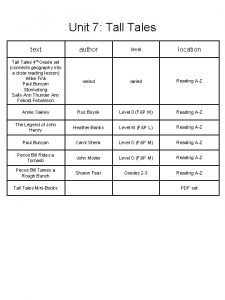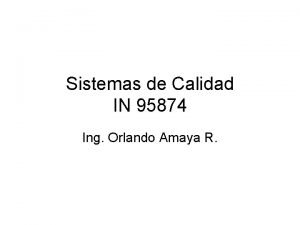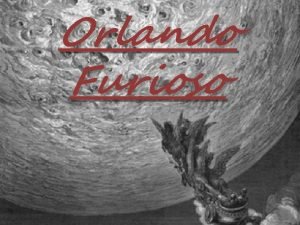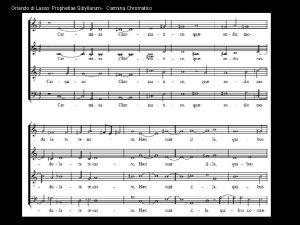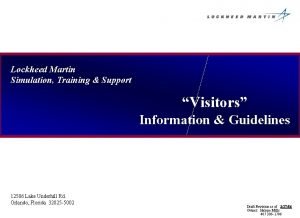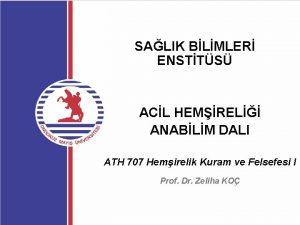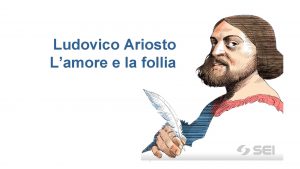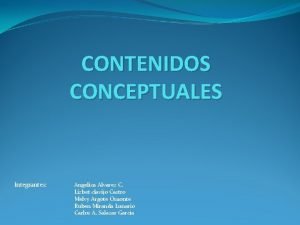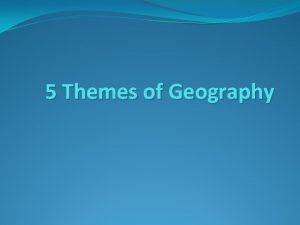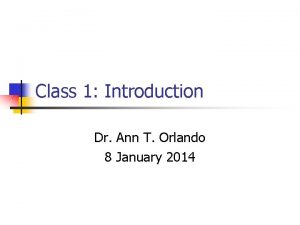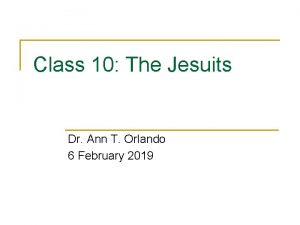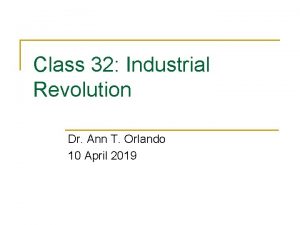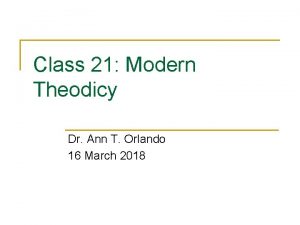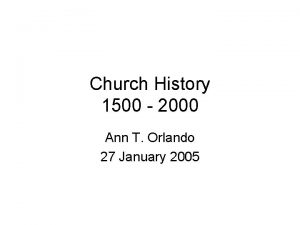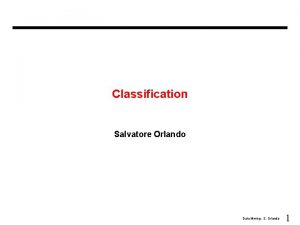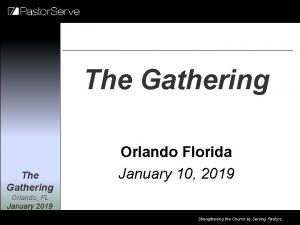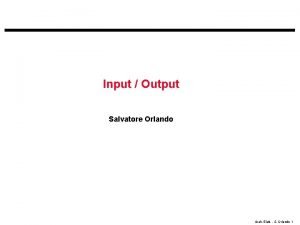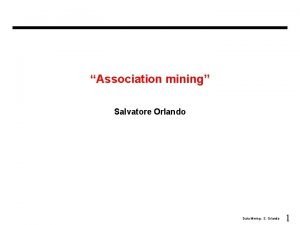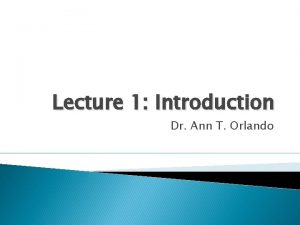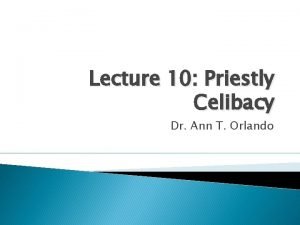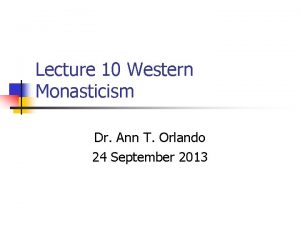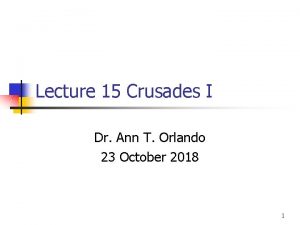Class 30 History of Dr Ann T Orlando




























- Slides: 28

Class 30: History of Dr. Ann T. Orlando 5 April 2019 th 19 C

Introduction n n Napoleon Political History of 19 th C

Napoleon (1769 -1821) n n n n Born in Corsica, attends Ecole Militaire in France Napoleon rises rapidly in French military; brilliant strategist q Battle of Rivoli against Austrians (1797) q Battle of Pyramids against Muslim army (1798) In a coup d’etat Napoleon seizes control of France; Napoleon declares himself First Consular (1799) q Battle of Marengo against Austrians (1800) Napoleon has himself declared Emperor, crowns himself (1804) q Napoleon invades Russia 1812 Because of military defeats, Napoleon toppled form power, sent into exile; Louis XVIII (brother of Louis XVI) assumes throne Napoleon returns to France, raises another army, defeated at Waterloo, Belgium by British 1815 Napoleon sent into exile at St. Helena’s; dies there in 1821

www. dean. usma. edu/HISTORY/web 03/atlases/napoleon%20 pages/napoleon% 20 map%2070. htm

Napoleon: Relations with Church n Social: Napoleonic Code q q n Concordat of 1801 q q q n Supports divorce Catholics opposed to Revolution who had hoped Napoleon would restore ‘Catholic France’, now think only hope for Catholic France is restoration on Monarchy Ended schism between clergy who signed Civil Constitution and those who did not Napoleon named bishops, but Pope ordained them Clergy paid by state Reinstated Gallican articles of 1682 In effect, made Catholicism in France a state Church Napoleon invaded Papal States in 1808 q q Pius VII excommunicated Napoleon; Napoleon takes him captive Congress of Vienna, 1815, returns control of Papal States to Pope

Effect of Pius VII Stance Against Napoleon n Re-established moral authority of Church, even for non-Catholics Many people convert to Catholicism Re-established Jesuits in 1814 q n Renewed activity in Jesuit Education (e. g. , Georgetown, BC, HC, Fordham) Renewed appreciation for Catholic intellectual life

Congress of Vienna (1815) n n After Battle of Waterloo, victors (England, Austria, Russia, Prussia) gather to try to restore Europe as it was before Napoleon Prince Klemens von Metternich q q n n The architect of the Congress of Vienna, His main goal was to support conservative governments in Europe and to establish a Balance of Power; this was to prevent another power dominating Europe as had France. The wartime allies against Napoleon: Austria, Britain, Russia, and Prussia signed the Quadruple Alliance, pledging them to uphold the peace settlement by entering into any war on behalf of he other. Reestablished Papal States under control of Papacy

France After Napoleon n n Brief restoration of monarchy Revolution 1848 French Republics Two powerful competing groups of Catholics in France q q Ultramontanes want strong Papacy to help rebuild French unity and culture; return to throne and altar Liberals want some aspects of pre-revolutionary French philosophes incorporated into Catholicism; individual freedom, democracy

Holy Roman Empire n n Napoleon ends Hapsburg line of Holy Roman Emperors in Spain and Austria; conquers all of Germany After defeat of Napoleon, Congress of Vienna, 1815, q n n Creation of German Confederation, semi-autonomous states Revolution of 1848 Rise of Bismarck and strong (anti-Catholic) national German government 1859 q King as figure head

Italy n n n 17 th and 18 th C various Italian States split between Austria (north) and Spain (south), except for Papal States 19 th C Napoleon conquered all of Italy; after Napoleon political turmoil; Congress of Vienna, 1815, restores Papal States Revolution of 1848 starts process of Italian unification q King Victor Emmanuel and Garibaldi as political leader 1861 Forcible annexation of Papal States in 1870 completes unification

Spain n n Brutally occupied by Napoleon After Napoleon’s defeat, Spain oscillated between q q q n Liberal republics (anti-Church) Restoration of absolute monarchies Conservative assemblies Spain also divided and in turmoil along geographic lines q q Catalonia Basques

England 17 th – 19 th C n n George I Hanover George III reigns 1760 -1820 q n n American Revolution Queen Victoria 1837 -1901 q During her reign Parliament becomes increasingly important relative to monarchy q By end of reign monarchy is head of State, not head of Government England becomes dominant world power q “The sun never sets on the British crown”

British Empire at End of 19 th C

New Religious Orders n In 19 th C new orders often established meet a local need q q n Revised Spirituality Social Welfare Education Medical Some new 19 th C orders q q q q q Assumptionists Oblates of Virgin Mary Marists Stigmatines Josephite Fathers Sisters of Immaculate Heart of mary Salesians of Don Bosco Congregation of Holy Cross Reconstituted Jesuits

Assumptionists n Founded in 1843 by Fr. Emmanuel D’Alzon in Nimes, France q q q n n Established a newspaper, La Croix, one of the oldest in France and a publishing house Actively opposed liberal tendencies in France q q n n Fr D’Alzon was a student of Lamennais, but broke with him Founded an order for men and women mostly focused on education Rule based on Augustine’s Rule La Croix published radical ultramontanists and political articles Also strongly supported Lourdes and organized first pilgrimages to Lourdes Assumptionist suppressed in France in 1900; returned in 1905 Since then, Assumptionists have had a world-wide apostolate, especially in Asia

Oblates of the Virgin Mary n Founded in 1816 in northern Italy by Fr. Bruno Lanteri q q q n Ministry q q n Based on Christian Friendship societies developed to help laity and clergy form groups dedicated to helping each other in the spiritual life Jesuit Spiritual Exercises Help revive the Church after French Revolution and Napoleon Preach missions Lead retreats Oblate communities are world-wide

Josephite Fathers n Founded by American bishops after the Civil War in 1871 to evangelize and serve African. Americans q n Initial priests from St. Joseph’s Society for Foreign Missions in London Josephites are found primarily in the Southern US

Sisters of Immaculate Heart of Mary n n n Founded in Spain by Fr. Joachim Masmija in 1848 Purpose was to revitalize Catholic society through the education of young women Within 20 years of their founding, Sisters of Immaculate Heart went to Los Angeles to found schools for girls q n From there they spread through much of the US and Mexico Three Immaculate Heart sisters were canonized and recognized as martyrs because of their deaths during Spanish Civil War

Some 19 th C Missionary Orders n Missionary Sisters of Immaculate Conception White Fathers and Missionary Sisters of Our Lady of Africa Missionaries of St Charles Borromeo Congregation of Immaculate Heart of Mary Missionaries n Maryknoll (20 th C) n n n

Maryknoll n Founded by Fr. James Walsh (Boston) and Fr. Thomas Price (North Carolina) to train young men foreign missions q n Maryknoll seminary established in Ossining, New York in 1912 q q n n Fr. Price died in Hong Kong in 1919 First priests sent to China, then Korea Especially known for schools and orphanages Maryknoll Sisters (1921) and Maryknoll Lay Missioners Maryknoll supports missions world-wide

Church Missionary Society n n British evangelical missionary organization (Baptist, Presbyterian, Methodist) Founded 1799 Major force in spread of Protestant Christianity in Asia and Africa throughout the 19 th C A de facto arm of British colonial efforts

19 th C Colonialism n Africa and Asia q q q n Expansion of trade and economic colonialism to control of territory To protect economic interests, colonial powers assume control of politics Missionaries have much less restricted reach into local populations Latin America q q Criollos wanted strong ties with industrialized US and Northern Europe Led to Protestant missions in Latin America starting in early 20 th C 22

Political Effect of Napoleon on Latin America n In 1808 Napoleon deposed King Ferdinand VII of Spain q q n Effect disrupted authority of Peninsulares; q n Napoleon replaced Ferdinand with his brother, Joseph Decreed that Spanish colonies must obey Joseph Allowed Criollos to establish their own governments When Ferdinand returned to throne by Congress of Vienna, Criollos refuse to relinquish power q q River Platte (Argentina, Paraguay, Uruguay) 1816 Chile 1818; Greater Columbia (Columbia, Venezuela, Panama, Equator) 1826 Brazil 1821

Complex relationship between Rome and Latin American Churches n Everyone called themselves a Catholic q n n n Higher social status, more allied with old world; especially true of bishops After revolutions, especially in Mexico, some propose national Catholic churches Tensions from two groups with Church hierarchy q q n Many early Latin American constitutions affirm Catholicism as the state religion Liberals, who wanted to follow economic and political models associated with US Lower clergy who increasingly saw the Church hierarchy as being out of touch with vast majority of people Historical backdrop to Liberation Theology

Protestant Missions in Latin America n n Wars of independence and association of Church with repressive sets conditions for advances of Protestants in Latin America Pentecostals q q q Founded by African Americans in 1906 in California Strong belief in the action of the Holy Spirit on the believer Soon spread among poor in Caribbean, Mexico and beyond

Colonialism in Africa n n n Greatly expanded in late 19 th, early 20 th C Berlin Conference 1884 -1885; how to divide Africa between England, France, Portugal, Spain, Italy, Belgium, Germany Religious missionaries follow these divisions 26

Colonial Africa www. mcps. k 12. md. us/departments/isa/ninvest/imperial/scrambleafrica. htm 27

Missions in China 19 th C n Protestant (English) Mission began in 1807 q q n Quickly developed in British-dominated seaports Later 19 th and 20 th C major push into inland Chinese missions Catholic Chinese missions q q Generally, Catholics (unlike Protestants) not welcome in China as a result of 17 th C Rites Controversy Subject to sporadic persecutions French priests from Viet Nam able to make some inroads in southern China Maryknoll missionaries in 20 th C revives Catholic Chinese missions
 John henry tall tale pdf
John henry tall tale pdf Ann hathaway poem
Ann hathaway poem Mrs tilscher's class annotated
Mrs tilscher's class annotated Victim service center orlando
Victim service center orlando Universal orlando mobile ticket vs print at home
Universal orlando mobile ticket vs print at home Dr matheus orlando
Dr matheus orlando Sygepleje processen
Sygepleje processen Orlando amaya
Orlando amaya Orlando nursing theory
Orlando nursing theory Tampa fsdo office
Tampa fsdo office Ejambement
Ejambement Periodo storico orlando furioso
Periodo storico orlando furioso Entralacement
Entralacement Orlando di lasso prophetiae sibyllarum
Orlando di lasso prophetiae sibyllarum Lockheed martin visitor center orlando
Lockheed martin visitor center orlando Ida jean orlando nursing process theory
Ida jean orlando nursing process theory Aon hewitt the woodlands
Aon hewitt the woodlands Hvad er egenomsorg
Hvad er egenomsorg Ida jean orlando kuramı
Ida jean orlando kuramı Medial patellofemoral ligament
Medial patellofemoral ligament Parafrasi la follia di orlando
Parafrasi la follia di orlando Ifma orlando
Ifma orlando Dr orlando pediatra
Dr orlando pediatra Angelica alvarez orlando
Angelica alvarez orlando Antonio orlando bristol
Antonio orlando bristol Orlando science center jobs
Orlando science center jobs Differenza tra ariosto e tasso
Differenza tra ariosto e tasso Hawthorne village orlando
Hawthorne village orlando 5 themes of geography place meaning
5 themes of geography place meaning
